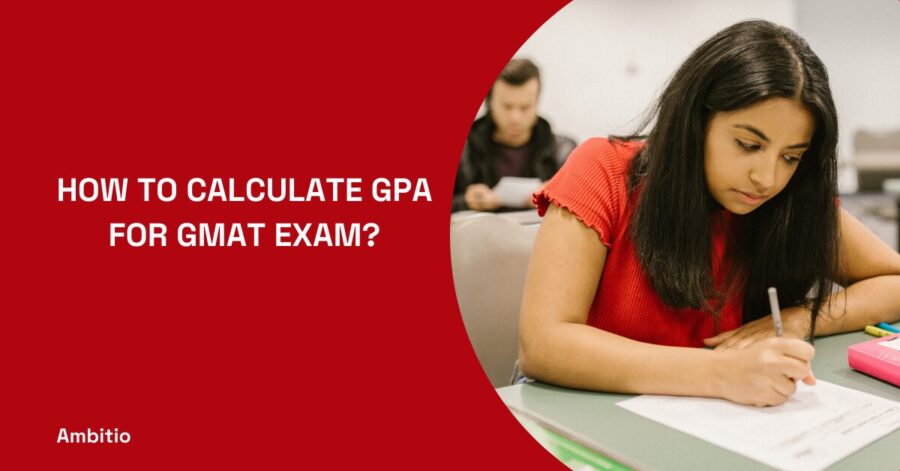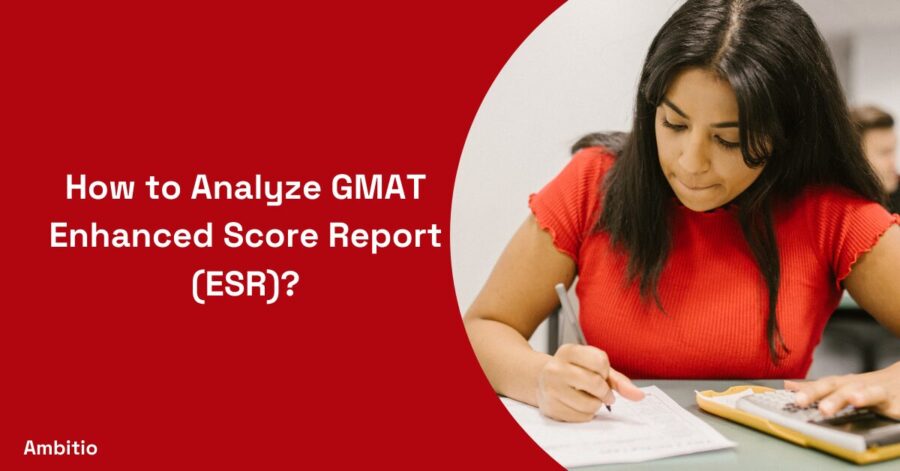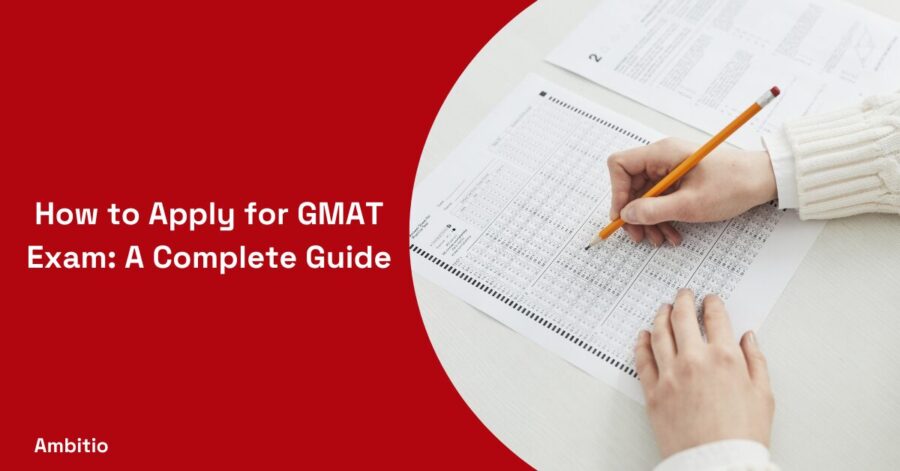17 May 2025
8 minutes read
4 Best GMAT Critical Reasoning Questions for Indian Students

Key Takeaways
- GMAT critical reasoning tests your ability to evaluate arguments, identify assumptions, and draw logical conclusions under timed conditions.
- GMAT critical reasoning questions focus on argument structure, making it essential to understand flaw types, evidence gaps, and logical consistency.
- GMAT critical reasoning success depends on mastering question types like strengthen, weaken, inference, and boldface through practice and strategy.
Critical Reasoning is one of the main sections of the GMAT exam as it evaluates your capacity to determine the strength of given arguments and logical premises, to name some of the key skills tested during the GMAT Critical Reasoning section.
This section is challenging yet vital to study to improve your verbal section and more significantly, hone your critical thinking skills required in a business environment.
The main premise here is that by fitting into a workable structure the manner by which you can analyze an argument as well as the cognitive skills that can be refined, this is the core of what can help you do better in GMAT and also in any profession you undertake in the future.
Best Practices for GMAT Club Critical Reasoning
Understanding the premise and the conclusion of an argument is key when tackling Critical Reasoning questions. In test prep, focus on dissecting the logic of the passage to identify these elements clearly.
The GMAT Critical Reasoning section, with its 23 questions, assesses your ability to analyze and evaluate arguments. Each different question type, such as strengthen questions, requires specific strategies. We know that GMAT adaptive test challenges your wits, so prepare accordingly.
When solving practice problems, always start by identifying the premise and conclusion. This foundation will help you understand what is being tested on the GMAT. Consistent practice with varied question types will enhance your ability to tackle this section effectively.
You can also seek the help of the right GMAT books to help you with the process. GMAT benefits are innumerous, so it justifies the kind of effort you have to put into it to crack the same.
Focus on the Question Stem First
When tackling the GMAT verbal section, it’s crucial to focus on the question stem first. The GMAT official guide emphasizes starting with the question stem to understand what you’re being asked to evaluate.
There are many GMAT beginners guide available as well, so you can start at your own pace. Whether it’s an assumption question, a flaw identification, or a boldfaced reasoning task, knowing the question type helps guide your approach to the given argument.
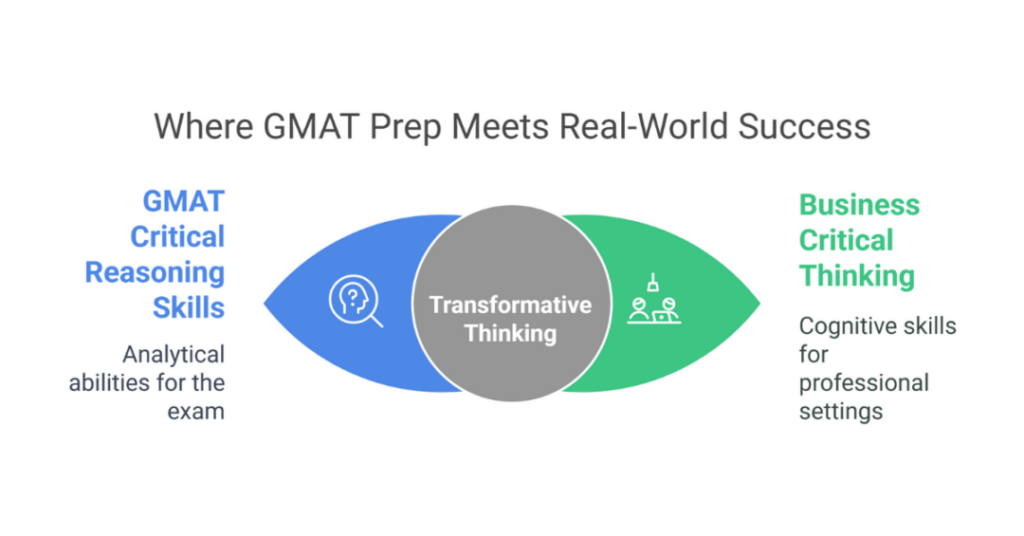
Reading the question stem first allows you to align your analysis with the required line of reasoning. When you approach the stimulus, identify the given information and use the process of elimination to discard incorrect choices.
Practicing with the official GMAT materials ensures familiarity with common question types and common logical fallacies.
Try your hand at various questions from the GMAT official guide to build your skills. This practice will help you quickly and accurately dissect the given argument and improve your performance on test day.
Deconstruct the Arguments
To excel in GMAT Critical Reasoning, start by carefully read the question. This helps test-takers focus on what is being asked before diving into the CR passage. In your initial reading, aim to understand the logic of the argument or plan presented.
When working on CR practice questions, remember that many answers are wrong because they don’t address the specific flaw or assumption in the argument. Typically, you will encounter 5 answer choices, and using the process of elimination is key.
The types of questions in critical reasoning you’ll see on the GMAT include assumptions, weaken/strengthen, and evaluation of plans. Regular practice will help you recognize patterns and improve your ability to deconstruct arguments efficiently.
Side by side, make it a priority to check GMAT college application deadlines so you don’t miss out on your dream colleges.
Analyze the Answers
For most people, breaking the GMAT 700 barrier seems like something impossible. But that need not be the case. What is a good GMAT score? Well that depends, but 700 is definitely up there. In GMAT Critical Reasoning, analyzing the answers is crucial.
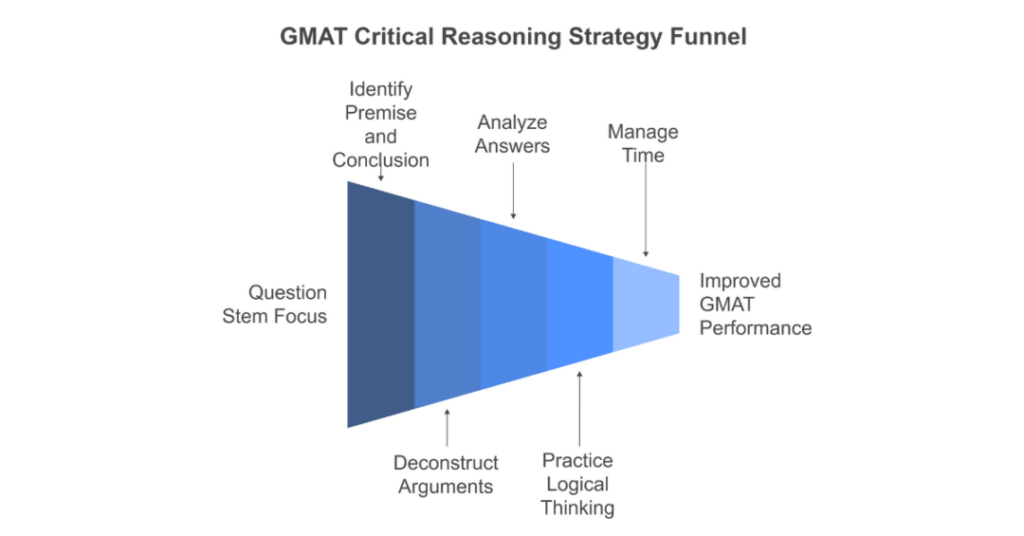
Many verbal questions include five answer choices, and identifying the incorrect answer is key to success. Your CR strategy should adapt based on the type of question—whether it’s an inference, assumption, or something else.
To hone your skills, focus on how each piece of information impacts the argument. When you evaluate an argument, consider what the test-taker needs to prove or disprove. A difficult CR question might trip you up if you don’t distinguish between what must be able to be inferred and what is merely plausible.
Improving your ability to analyze answers will boost your verbal score. If you get it wrong, review why—was the first is an opinion and not a fact? Understanding these nuances will help you better tackle the challenging verbal questions on test day.
If you have not started yet, you can do so now even because there is a best way to prepare for GMAT in two months as well.
Practice Logical Thinking
To excel in the Critical Reasoning section and cracking the GMAT, focus on practicing logical reasoning. Start by carefully read the question stem to understand what’s being asked. Analyzing the argument’s reasoning is essential for tackling the many GMAT questions you’ll encounter.
Utilize official GMAT Critical Reasoning practice materials to familiarize yourself with the types of questions on the GMAT exam. This practice will help you improve your ability to dissect arguments and identify logical flaws, which is critical to beat the GMAT exam.
There are also complete GMAT strategy guide set available for people who want to get their basics absolutely right.
Manage Your Time
Effective time management is crucial for the GMAT. Critical reasoning questions are designed to test your ability to analyze arguments quickly. When you read GMAT questions, focus on what the question asks to avoid spending time on trap answer choices. GMAT time is an absolute game changer if mastered.
For every question you encounter on GMAT, such as those that weaken an argument, you must be able to identify the key elements swiftly. Practice pacing to ensure you can handle all questions within the allotted time.
GMAT Critical Reasoning Practice Questions
Out of the different questions you encounter on the GMAT, critical reasoning GMAT questions are one of the toughest, coming second only to functions GMAT questions.
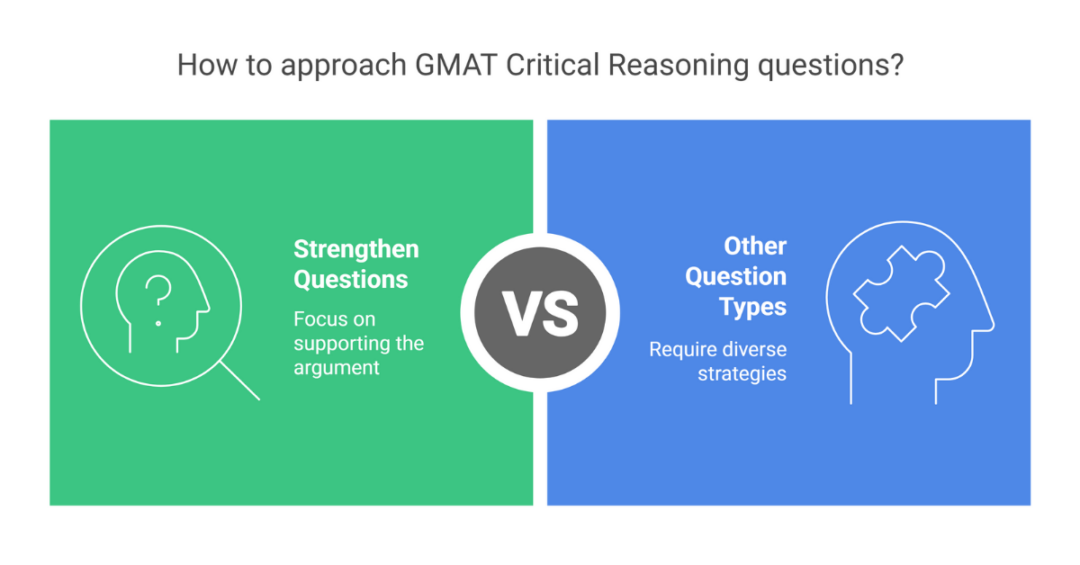
Here are some common critical reasoning sample questions which you can use to brush up your skills:
Question 1
Argument: “Many companies require job applicants to have a college degree. However, studies show that the skills required for most jobs can be learned on the job or through vocational training. Therefore, companies should not require a college degree for employment.”
Question: Which of the following, if true, would most strengthen the argument?
A) Companies that do not require a college degree have a higher employee turnover rate.
B) Many successful employees do not have a college degree.
C) Vocational training programs are more cost-effective than college education.
D) Job applicants with college degrees tend to have higher starting salaries.
E) Employees without college degrees often need additional training once hired.
Solution: The argument is that companies should not require a college degree because skills can be learned on the job or through vocational training. To strengthen this argument, we need evidence that supports the effectiveness of vocational training or on-the-job learning compared to a college degree.
Answer: B This choice strengthens the argument by showing that many successful employees do not have a college degree, indicating that a degree is not necessary for job success.
Question 2
Argument: “The new city ordinance requires all restaurants to list calorie counts on their menus. Proponents argue that this will help customers make healthier food choices. However, some studies suggest that simply providing calorie information does not significantly change consumer behavior.”
Question: Which of the following, if true, would most weaken the argument that listing calorie counts will help customers make healthier food choices?
A) Customers in cities with calorie count listings have reported increased satisfaction with their dining experience.
B) Restaurants that list calorie counts often offer more low-calorie options.
C) A majority of customers ignore calorie information when ordering food.
D) Other factors, such as taste and price, have a greater influence on customer choices than calorie information.
E) Customers who are aware of calorie counts tend to eat fewer high-calorie foods over time.
Solution: The argument that calorie information provided to consumers and making them select foods with lower calorie information will assist them to make the right decisions would be weakened if consumers are shown to ignore this information in the process of selection.
Answer: C This choice counteracts the argument by suggesting that a significant amount of customers do not pay attention to calorie leads, implying that the ordinances may not necessarily be effective.
Question 3
Argument: “Studies show that a person who exercises, regularly, is less likely to succumb to chronic diseases’ illnesses. Strengthening the effectiveness of prevention activities Using this information, the promotion of which one can be considered as the prevention agenda of the highest priority.
QUESTION: Which of the following, if true, best supports the argument above?
A) Advanced preventive checks of diseases are highly developed in the urban regions than in the rural regions.
B) A healthy body in particular through exercise has benefits on the state of mind.
C) Regular exercise is evident in many individuals who also take their diets in equal voucher.
D) Other countries have been able to launch effective and engaging exercise campaigns in a way that resonated positively with the public.
E) The above chronic diseases are costly to treat than promoting exercises, which are principles of the preventative health.
Solution: The method of the argumentation states that increasing the physical activity rates among the population should be a high-priority intervention in public health as it prevents chronic non-communicable diseases. The answer should be in a way that will align to the intention of supporting the fact that encouraging exercise is helpful to the health of the people.
Answer: E This choice adds another advantage and answers the previous RHA questions to discuss how exercise is more economical than dealing with chronic diseases.
Question 4
Argument: “Attendance at the city’s annual arts festival has been declining over the past few years. To increase attendance, the organizers should consider lowering the ticket prices.”
Question: Which of the following, if true, most seriously weakens the argument?
A) The arts festival features popular artists and performers.
B) The festival is held at a time of year when many residents are on vacation.
C) Surveys indicate that most people who attended the festival thought the ticket prices were reasonable.
D) Other cities with lower ticket prices for similar festivals have also seen declining attendance.
E) The festival has been receiving less media coverage than in previous years.
Solution: The argument suggests lowering ticket prices to increase attendance. To weaken this argument, we need evidence that lowering prices would not necessarily lead to higher attendance.
Answer choice: C This choice weakens the argument by showing that people who attend the festival do not find the ticket prices to be an issue, suggesting that lowering prices may not impact attendance.
Conclusion
The Critical Reasoning is one of the sections tested within the GMAT and is one of the easiest to improve upon. The nature of strategies you will employ will be similar to those applied in the practice of answering GMAT questions.
All the questions given here tend to measure self-assessment and evaluation of arguments from the efficiency point of view. Always make sure to keep a level head before the exam, and do not forget to take your GMAT admit card with you before the exam.
By using the GMAT Critical Reasoning tricks explained above and practicing taking the actual test through proper official practice tests, one has a high chance of improving their scores on the exam.
There are executive MBA without GMAT available for the candidates who do not want to give the exam a try, but for those of you who want to crack it, start your preparations today!
Conquer the GMAT with Ambitio’s tailored preparation program. Our targeted resources, including comprehensive content reviews and realistic practice exams, are designed to meet your unique needs, helping you to become a top scorer and standout applicant.
FAQs
What is GMAT critical reasoning and why is it important?
GMAT critical reasoning is a section that evaluates your ability to analyse arguments and logic. Mastering GMAT critical reasoning is vital for a high verbal score.
How many GMAT critical reasoning questions are there on the test?
Typically, the GMAT critical reasoning section includes around 10–13 questions. These GMAT critical reasoning questions are part of the Verbal Reasoning section.
What are the common question types in GMAT critical reasoning?
GMAT critical reasoning covers types like strengthen, weaken, assumption, and inference. Understanding these GMAT critical reasoning question types is key to scoring well.
How can I improve my GMAT critical reasoning skills?
To improve GMAT critical reasoning, practice identifying arguments and flaws daily. Consistent exposure to GMAT critical reasoning patterns sharpens logical thinking.
Is timing a challenge in GMAT critical reasoning?
Yes, GMAT critical reasoning demands quick analysis within 2 minutes per question. Efficient GMAT critical reasoning strategy can significantly boost overall timing.
Can reading comprehension help with GMAT critical reasoning?
Yes, reading comprehension improves focus and logic for GMAT critical reasoning. The ability to understand structure is crucial for GMAT critical reasoning success.
Are there free resources to practice GMAT critical reasoning?
Many platforms offer free GMAT critical reasoning questions and guides. Using official and third-party GMAT critical reasoning resources builds confidence and accuracy.

You can study at top universities worldwide!
Get expert tips and tricks to get into top universities with a free expert session.
Book Your Free 30-Minute Session Now! Book a call now















